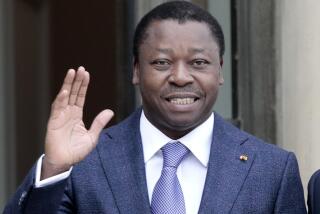Taiwan Moves to Consolidate Power
- Share via
BEIJING — Taiwan passed a series of constitutional reforms on Tuesday designed to consolidate political power in the hands of the two major parties and ensure that future amendments were approved directly by voters, a provision opposed by Beijing.
Small parties, aware that their power would almost certainly be reduced, tried unsuccessfully to delay the proceedings by holding up placards, waving banners and interrupting the speaker. But support by the ruling Democratic Progressive Party, which follows a pro-independence line, and the main opposition Nationalists, favoring closer ties with Beijing, ensured passage of the reform measures.
The four amendments received 249 votes in the 300-member National Assembly, two dozen more than what was required for passage.
Some analysts expressed hope that the changes would help the island become more politically stable by concentrating power.
“I think it’s the start of an era of two-party politics in Taiwan, so generally, it’s a good thing,” said Emile Sheng, a political scientist with Taiwan’s Soochow University. “The past system was so strange.
“Sometimes you’d have 30 people running in the same district. It was like a lottery or some sort of dinner party competition. Now smaller parties will no longer have such impact.”
The specific provisions expected to erode the power of minority parties include an amendment that cut the size of Taiwan’s legislature to 113 seats and another that institutes a winner-take-all system in electoral constituencies.
Beijing has opposed direct popular approval of amendments in Taiwan, fearful that pro-independence parties could use this method to declare independence. China and Taiwan split in 1949 after a civil war, but China views the island as a rightful part of its territory and has vowed to use force if the Taiwanese try to formally separate.
It would be very difficult to pass a new constitutional amendment in Taiwan, given a requirement that any change be approved by a “supermajority” of all eligible voters, not simply all voters who turn out.
Hsu Yung-ming, a political scientist at Academia Sinica, Taiwan’s foremost think tank, said Tuesday’s moves allowed President Chen Shui-bian to claim partial victory for having reformed the constitution -- an earlier pledge to voters -- while giving Beijing a modicum of security in the form of the relatively high bar needed to pass an amendment.
Li Jiaquan, a Taiwan expert based in Beijing, said China had made its views on Tuesday’s amendments known and was watching closely.
“Of course we oppose it,” said Li, formerly with Beijing’s Chinese Academy of Social Sciences. “But we’re not afraid of it. We now have our anti-secession law, which sets out our bottom line.”
In March, Beijing passed a controversial law that approved the use of force should Taiwan declare independence.
“Just so long as Taiwan doesn’t get involved with sovereignty issues,” Li said. “But if they go beyond our bottom line, as our leaders have said, we’ll do anything necessary.”
Chen has repeatedly outlined plans to embark on a second phase of constitutional reform that would seek to address whether Taiwan should adopt a presidential or parliamentary system of government and how many branches of government would be needed.
Yin Lijin of The Times’ Beijing Bureau and special correspondent Tsai Ting-I in Taiwan contributed to this report.
More to Read
Sign up for Essential California
The most important California stories and recommendations in your inbox every morning.
You may occasionally receive promotional content from the Los Angeles Times.













